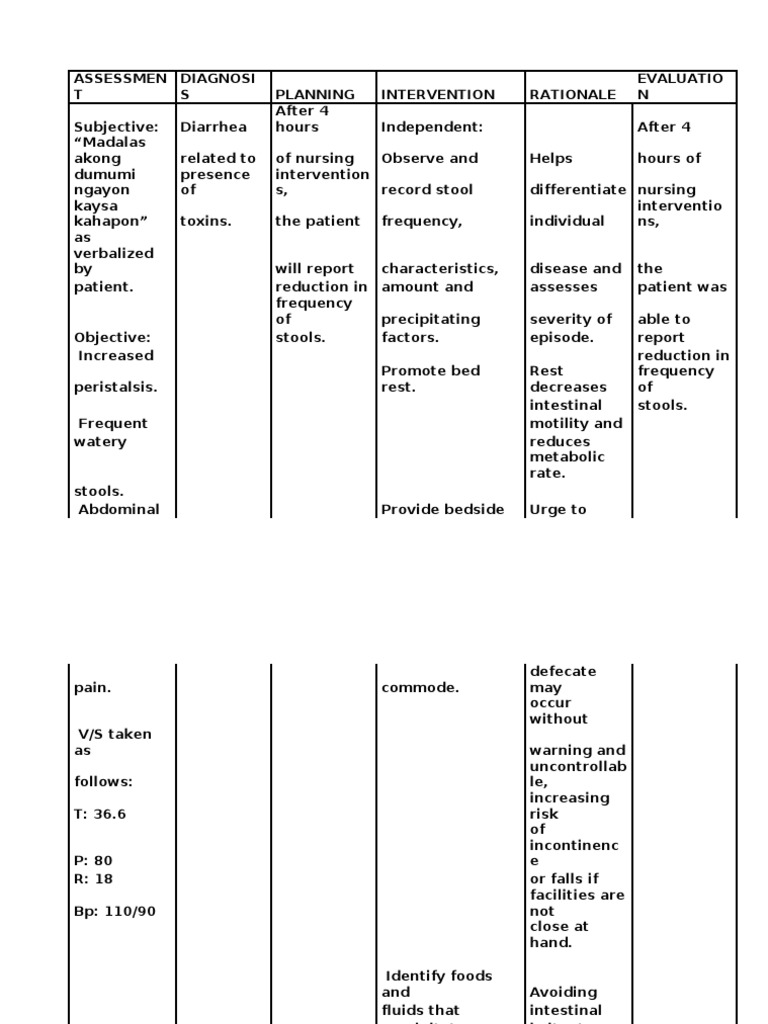Imagine this: You’re a nurse working in a busy hospital ward, and a patient comes in with a severe case of diarrhea. They’re weak, dehydrated, and feeling incredibly uncomfortable. You know that prompt and effective nursing care is crucial to their well-being. But where do you start?

Image: www.scribd.com
Diarrhea, a common ailment that can affect people of all ages, can be a distressing and potentially dangerous condition. While most cases resolve on their own, diarrhea can lead to complications like dehydration and electrolyte imbalances, especially in vulnerable populations like infants, older adults, and people with compromised immune systems. This is where a well-structured nursing care plan comes in. It allows nurses to deliver patient-centered care, addressing the individual needs of each person experiencing diarrhea.
Understanding the Importance of a Nursing Care Plan
A nursing care plan for diarrhea acts as a roadmap, outlining the steps needed to manage the patient’s symptoms, restore their health, and prevent further complications. This plan is not a rigid set of instructions but rather a flexible framework that can be adapted to the unique circumstances of each patient.
Key Components of a Nursing Care Plan for Diarrhea
A comprehensive nursing care plan for diarrhea typically includes these essential components:
- Assessment: The first step is a thorough assessment of the patient’s condition. This involves gathering information about their symptoms, including the frequency and consistency of stools, any abdominal pain, and the presence of any other signs of illness.
- Diagnosis: Based on the assessment, nurses will identify relevant nursing diagnoses related to diarrhea, such as “risk for fluid volume deficit,” “impaired skin integrity,” or “impaired nutrition.”
- Planning: This involves setting goals for the patient’s care, taking into consideration their individual needs and preferences.
- Implementation: This stage involves putting the care plan into action. This includes various interventions, such as administering oral rehydration solutions, monitoring fluid intake and output, and providing dietary guidance.
- Evaluation: Regularly evaluating the patient’s progress is crucial. This involves assessing the effectiveness of interventions, making necessary adjustments to the plan, and ensuring the patient is achieving their goals.
Sample Nursing Care Plan for Diarrhea
Here is a sample nursing care plan for a patient experiencing diarrhea. Remember, this plan is a general guide and should be adapted based on the individual patient’s needs.
Patient Name: John Doe
Age: 65
Date: 10/26/2023
Diagnosis: Diarrhea
Nursing Diagnoses:
- Risk for fluid volume deficit
- Impaired skin integrity
- Impaired nutrition
- Activity intolerance
Goals:
- Maintain adequate hydration.
- Prevent skin breakdown.
- Ensure adequate nutritional intake and prevent malnutrition.
- Promote patient comfort and reduce activity intolerance.
Interventions:
Fluid Management:
- Assessment: Monitor fluid intake and output hourly. Assess for signs of dehydration, including thirst, dry mouth, sunken eyes, decreased urine output, and increased heart rate.
- Intervention: Administer oral rehydration solutions (ORS), such as Pedialyte or Infalyte, as prescribed. Encourage the patient to drink clear fluids like water, broth, and electrolyte beverages regularly.
- Evaluation: Monitor vital signs, especially heart rate, blood pressure, and temperature. Ensure adequate fluid intake and output. Reassess for signs of dehydration.
Skin Integrity:
- Assessment: Inspect the patient’s skin for any signs of irritation or breakdown, especially around the perineal area.
- Intervention: Keep the patient’s skin clean and dry. Apply protective barrier cream or ointment to prevent skin breakdown. Use incontinence briefs or pads as needed.
- Evaluation: Monitor patient’s skin condition for improvement. Adjust interventions as needed to prevent further skin breakdown.
Nutritional Management:
- Assessment: Assess the patient’s nutritional status, including their usual diet and any allergies or intolerances.
- Intervention: Encourage the patient to eat bland foods, such as toast, crackers, rice, and bananas. Avoid foods that are high in fat, fiber, or spice.
- Evaluation: Monitor the patient’s appetite and stool consistency. Adjust dietary recommendations based on the patient’s response.
Activity Intolerance:
- Assessment: Assess the patient’s activity level and note any reported fatigue or weakness.
- Intervention: Encourage rest and limit physical activity. Provide assistance with ambulation as needed.
- Evaluation: Monitor the patient’s energy level and ability to participate in activities of daily living.
Additional Interventions:
- Medication Administration: Administer antidiarrheal medications as prescribed to manage the frequency and volume of stools.
- Monitoring: Closely monitor vital signs, including temperature, heart rate, blood pressure, and respiratory rate.
- Education: Educate the patient and their family about diarrhea, its causes, and appropriate management.
- Support: Provide emotional support to the patient and their family, answering their questions and addressing their concerns.

Image: ar.scribd.com
Nursing Insights and Actionable Tips
Diarrhea often causes stress for patients, and nurses play a crucial role in providing reassurance and comfort. Creating a trusting and supportive environment is essential. Empathy and patience are key when dealing with patients experiencing discomfort and inconvenience.
Remember, nursing care is not one-size-fits-all. Each patient is unique, and their plan should be tailored to their individual needs. A successful nursing care plan requires ongoing collaboration between nurses, other healthcare providers, and the patient themselves. By working together, we can ensure the best possible outcomes for people experiencing diarrhea.
Sample Nursing Care Plan For Diarrhea
Conclusion
A comprehensive nursing care plan for diarrhea is a vital tool for providing effective and compassionate care. By implementing a well-structured plan that addresses the patient’s needs, nurses can help manage symptoms, prevent complications, and empower patients to recover quickly and safely. This plan acts as a guiding framework for delivering excellent patient-centered care. Remember, consistency, communication, and empathy are key to providing the best possible care for all individuals experiencing diarrhea.






